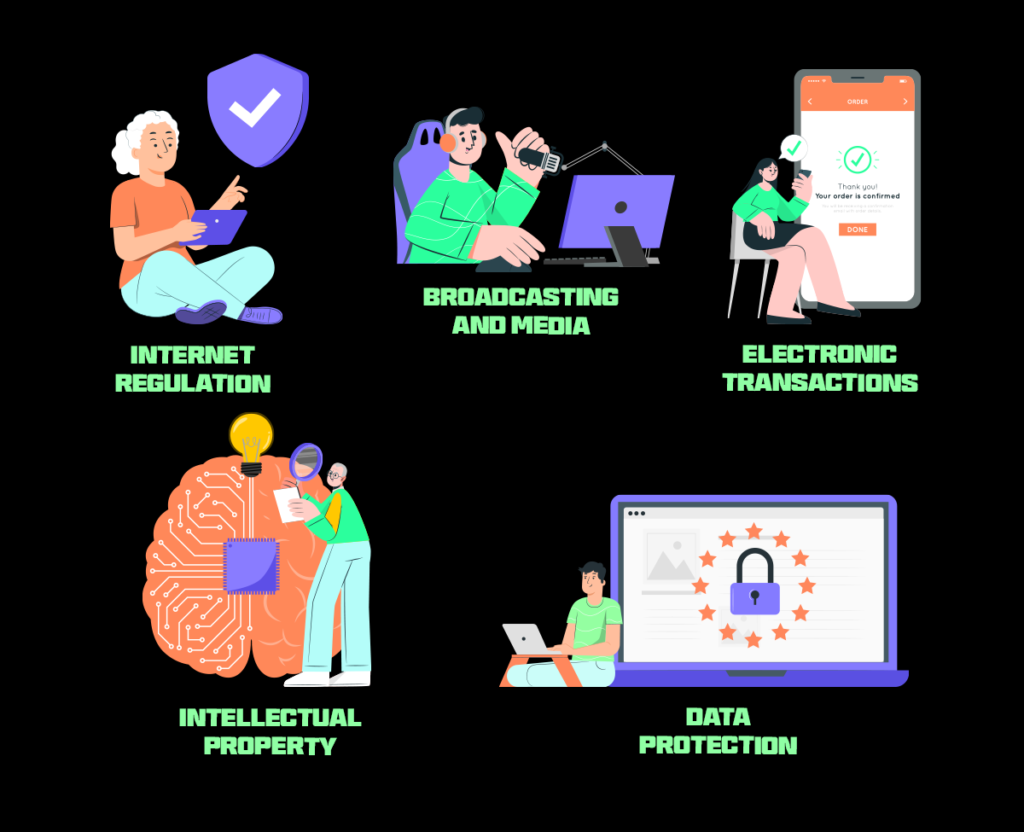
Singapore is one of the most premium e-commerce markets in Southeast Asia, driven by high internet penetration and a tech-savvy population. The average order value is US$137, making it a prime destination for online retail businesses. As the e-commerce industry continues to grow, it’s crucial to understand the list of laws in Singapore governing this space. These regulations help online retailers ensure compliance and avoid costly mistakes. This blog outlines key laws in Singapore that every e-commerce business should know to maintain a legally sound online presence.
- Internet Code Of Practice
- Singapore Broadcasting Authority Act
- Electronic Transactions Act
- Misrepresentations Act
- Sale of Goods Act
- Trade Marks Act
- Personal Data Protection Act
- Regulations governing warehouse storage
- Regulations for product labeling
- Laws monitoring the use of plastic packaging
Internet Code Of Practice
The Internet Code of Practice, established by Singapore’s Infocomm Media Development Authority (IMDA), sets standards for content published online. Its goal is to ensure that digital platforms follow guidelines that protect public interest, morality, and safety, particularly in relation to harmful or inappropriate material. It is one of the key regulations among Singapore’s e-commerce laws.
Purpose of the Law
The Internet Code of Practice aims to regulate online content to prevent the spread of material that may be harmful based on criteria like public interest, morality, security, and national harmony. This regulation is crucial in maintaining a safe online environment for all users, especially vulnerable groups such as children.
Implications for E-commerce Businesses
- Content Regulation: E-commerce businesses must ensure that their websites and marketing materials do not contain prohibited content as defined by the Code. This includes avoiding any material that could be considered offensive or harmful to public interests.
- Compliance Responsibilities: Companies are required to implement measures to filter out prohibited content and maintain community standards.
Potential Penalties: Non-compliance with the Internet Code of Practice can lead to penalties, including the possibility of having content removed or being required to block access to certain materials.
Singapore Broadcasting Authority Act
The Singapore Broadcasting Authority Act is responsible for regulating broadcasting services and ensuring that they operate within the framework of Singaporean law. The Act outlines the authority’s powers regarding the operation, ownership, and content of broadcasting services in Singapore.
Purpose of the Law
The Singapore Broadcasting Authority Act was added to the list of laws in Singapore to:
- Regulate the operations and ownership of broadcasting services.
- Ensure that broadcasting content adheres to national standards and public interest.
Implications for E-commerce Businesses
- Content Compliance: E-commerce businesses that utilize broadcasting channels (e.g., advertisements on social media) must ensure that their content complies with regulations set forth by the SBA. This includes avoiding objectionable material and adhering to guidelines on advertising standards.
- Monitoring and Reporting: E-commerce businesses must be prepared for ongoing monitoring by regulatory authorities. They may need to report on their compliance with broadcasting regulations, particularly if they engage in advertising through these mediums.
- Penalties for Non-compliance: Failure to comply with the provisions of the Broadcasting Authority Act can result in penalties, including fines or revocation of broadcasting licenses.
Electronic Transactions Act
The Electronic Transactions Act (ETA) was first enacted in Singapore in 1998. It provides a comprehensive legal framework for electronic transactions, ensuring that electronic records and signatures are legally recognized and enforceable. It aims to facilitate the growth of e-commerce by providing clarity regarding the rights and obligations of parties involved in electronic transactions.
Purpose of the Law
- Establish the legal validity of electronic records and signatures, thereby promoting confidence in electronic transactions.
- Provide a framework for the formation and enforcement of contracts conducted electronically.
- Ensure that electronic communications are treated as legally equivalent to traditional paper-based communications.
Implications for E-commerce Businesses
- Legal Recognition of Electronic Records: E-commerce businesses can use electronic records for contracts and transactions without fear of legal challenges regarding their validity.
- Use of Electronic Signatures: The Electronic Transactions Act allows businesses to utilize electronic signatures in place of traditional handwritten signatures.
- Businesses must ensure that electronic records are retained in a manner that meets specific legal standards, including accessibility for future reference and maintaining the integrity of the original record.
- Cross-border transactions: Amendments to the ETA introduced provisions for electronic transferable records, such as electronic bills of lading. This is particularly beneficial for businesses involved in international trade, as it allows for faster processing times and reduces risks associated with fraud.
Struggling with complex cross-border documentation?
Locad simplifies international trade with secure electronic records, making transactions faster and fraud-free.
Misrepresentations Act
The Misrepresentation Act in Singapore is essential among the list of laws in Singapore. It addresses situations where false statements are made during contract negotiations. The act allows individuals to seek legal remedies if they were misled into entering a contract based on incorrect information, such as canceling the contract or seeking damages.
Purpose of the Law
- Ensures that individuals are not misled into entering contracts based on false or misleading statements.
- The Act allows affected parties to either cancel the contract (rescission) or seek financial compensation (damages) if they have relied on false statements.
Implications for E-commerce Businesses
- Contractual Clarity: E-commerce businesses must ensure that all representations made about products or services (e.g., descriptions, specifications) are accurate and truthful. Misleading claims can lead to legal actions under the Misrepresentation Act.
- Types of Misrepresentation:
- Innocent Misrepresentation: If a business unknowingly makes a false statement, it may still face liability if the other party relied on that statement.
- Negligent Misrepresentation: If a business makes a statement without reasonable grounds for believing it to be true, it can be held liable for damages. E-commerce businesses must exercise due diligence in verifying claims made in advertisements and product descriptions.
- Fraudulent Misrepresentation: If a business knowingly makes false statements to induce another party into a contract, it can face severe penalties, including both rescission and damages.
- E-commerce businesses must be aware that consumers who have been misled can seek remedies such as rescission (canceling the contract) or damages. This can impact customer relations and brand reputation if not managed properly.
Sale of Goods Act
This act provides a comprehensive legal framework for contracts involving the sale of goods, establishing the rights and obligations of both buyers and sellers. The Act applies to any contract where a seller transfers or agrees to transfer property in goods to a buyer for a price.
Purpose of the Law
- Regulate the formation and performance of contracts for the sale of goods.
- Impose certain implied terms into contracts, such as the seller’s right to sell the goods and that goods must be of satisfactory quality and fit for purpose.
- Outline the rights and duties of buyers and sellers.
Implications for E-commerce Businesses
- E-commerce businesses must understand that contracts for the sale of goods can be formed through various means, including written agreements, oral agreements, or implied conduct. This flexibility allows online transactions to be legally binding, even without formal documentation.
- The Sale of Goods Act imposes important terms in sales contracts. For instance, businesses must ensure that products sold are of satisfactory quality and fit for any specific purpose communicated by the buyer. Failure to meet these standards can lead to claims for breach of contract.
Product quality is critical during shipment.
Locad’s camera-monitored warehouses ensure all goods are in perfect condition, meeting the highest standards of the Sale of Goods Act.
Trade Marks Act
The Trade Marks Act act governs the registration, protection, and enforcement of trademarks in the country. The Act establishes a legal framework for individuals and businesses to register their trademarks, ensuring exclusive rights to use these marks in commerce. It aims to protect consumers from confusion and deception by ensuring that trademarks are distinctive and not misleading.
Purpose of the Law
- Provide a legal mechanism for the registration of trademarks, granting exclusive rights to owners.
- Protect consumers by preventing confusion between goods and services offered by different traders.
Implications for E-commerce Businesses
- E-commerce businesses are encouraged to register their trademarks to gain exclusive rights over their brand names, logos, and slogans. This registration is crucial for protecting brand identity in a competitive online marketplace.
- The Act provides remedies for trademark infringement, allowing businesses to take legal action against unauthorized use of their registered marks.
- Registered trademarks are protected for an initial period of 10 years, after which they can be renewed indefinitely for further 10-year periods. E-commerce businesses must keep track of renewal deadlines to maintain their trademark rights.
- The Act stipulates that registered trademarks must be used in commerce; failure to do so can lead to revocation of the trademark. E-commerce businesses should actively use their registered marks in marketing and sales to maintain their protection.
- For e-commerce businesses looking to expand internationally, understanding the Trade Marks Act is crucial as it aligns with global standards.
Ensure your brand stands out with custom packaging from Locad.
Our solutions help protect your trademarks and enhance product identity!
Personal Data Protection Act
The Personal Data Protection Act (PDPA) regulates how organizations collect, use, disclose, and manage personal data. It aims to safeguard individuals’ privacy while allowing for the responsible use of data in business operations.
Purpose of the Law
- Protect individuals’ data from misuse while recognizing the need for organizations to collect and use such data for legitimate purposes.
- Establish clear rules governing the handling of personal data, thereby enhancing consumer trust in organizations that manage their information.
Implications for E-commerce Businesses
- E-commerce businesses must obtain explicit consent from individuals before collecting, using, or disclosing their personal data. This means clear communication about the purpose of data collection is essential, and consent must be documented.
- Personal data should only be retained as long as necessary for fulfilling its intended purpose. Once it is no longer needed, businesses must securely dispose of or anonymize the data.
- E-commerce businesses transferring personal data outside Singapore must ensure that the receiving country provides a comparable level of protection as outlined in the PDPA.
Singapore has seen a 319% surge in data breaches.
Locad’s secure Order Management System safeguards customer data, ensuring full compliance with the PDPA.
Regulations governing warehouse storage
- Licensed Warehouse Scheme: Allows approved companies to store imported dutiable goods (e.g., liquor, tobacco) with suspended duties and GST until they are removed for local use or export. There are three types of licenses under this scheme, each with different compliance requirements.
- Bonded Warehouse Regulations: A bonded warehouse permits the storage of goods without paying customs duties and GST until they are released for the local market or re-exported. This is beneficial for managing cash flow and deferring payment of duties.
- Fire Safety Requirements: Warehouses must comply with fire safety regulations outlined by the Singapore Civil Defence Force (SCDF). This includes guidelines on storage height limits, sprinkler systems, and compartmentalization to ensure safety during storage.
Regulations for product labeling
- Labels on imported food, drugs, liquors, paints, and solvents must specify the country of origin. The Singapore Food Agency (SFA) administers this act to ensure food safety and proper labeling.
- Nutri-Grade System:
- Implemented by the Ministry of Health, this system rates pre-packaged non-alcoholic beverages based on sugar and saturated fat levels. Labels are mandatory for categories “C” and “D,” with advertising restrictions for category “D” beverages.
- Medicines must have specific labels with important details like the active ingredient, product license number, and dealer information. These are checked before approval to sell the product in Singapore.
- Some products, like electrical items and gas appliances, need a SAFETY Mark to show they meet safety standards. These products are tested and certified before being sold.
- Products used to measure (like weighing scales or fuel dispensers) need an ACCURACY Label, ensuring they are accurate for trade use.
E-commerce businesses must ensure their product labels comply with Singapore’s regulations.
Locad provides custom label creation services to ensure compliance with all legal requirements.
Laws monitoring the use of plastic packaging
Singapore has introduced various regulations and initiatives to reduce plastic packaging in e-commerce. Key initiatives include:
- Mandatory Packaging Reporting (MPR): This scheme requires businesses to report on the types and weights of packaging they produce, import, or sell. Companies must also submit their 3R (reduce, reuse, recycle) plans to the National Environment Agency (NEA). The aim is to increase awareness and incentivize businesses to adopt more sustainable packaging practices.
- Extended Producer Responsibility (EPR): Set to be fully implemented by 2025, the EPR law holds businesses accountable for the collection, treatment, and disposal of their products after use, ensuring a circular economy and minimizing waste.
- Reusable Packaging: Programs like MOLU encourage consumers to return packaging for reuse or recycling. SingPost also offers a free return service for reusable packaging to promote sustainability in shipping.
33% of consumers in Singapore chose to use sustainable packaging for their online purchases
Choose Locad for customized eco-friendly packaging solutions and comply with regulations!
How Does Locad Support Compliance for E-commerce Businesses
Navigating the regulations in Singapore can be complex, especially for e-commerce businesses. Locad provides tailored logistics solutions that help businesses remain compliant with these regulations.
- Data Privacy and Security: Locad’s Order Management System (OMS) is designed to prioritize data privacy, keeping customer information secure in compliance with Singapore’s Personal Data Protection Act (PDPA). By managing sensitive details such as customer addresses and contact information in a controlled environment, Locad helps businesses protect consumer data throughout the fulfillment process.
- Cross-border Compliance and Documentation: For businesses involved in international trade, Locad’s Importer of Record (IOR) and Shipper of Record (SOR) services ensure smooth cross-border compliance. Locad handles the necessary customs documentation and processes for importing goods into Singapore, reducing the risk of non-compliance and delays. These services simplify compliance with local import/export laws, allowing businesses to operate seamlessly in the global market.
- Transparency and Accuracy in Order Fulfillment: To support businesses in meeting the standards of the Sale of Goods Act, Locad provides precise inventory management and product tracking. This helps businesses fulfill orders accurately and on time, enhancing customer satisfaction and ensuring compliance with legal requirements. Our camera-monitored warehouses further safeguard product quality, ensuring that items shipped to customers are in the right condition, in line with the Misrepresentation Act, to prevent any discrepancies in product appearance or quality.
- Custom Packaging and Trademark Protection: Locad also supports businesses in building brand identity by offering custom packaging options where trademarks, logos, and other brand elements can be prominently displayed. This helps businesses ensure brand consistency and preventing misrepresentation.
Conclusion
Understanding and complying with the list of laws in Singapore is essential for e-commerce businesses to operate smoothly and avoid legal pitfalls. By adhering to these regulations, businesses can protect their operations and ensure long-term success.











